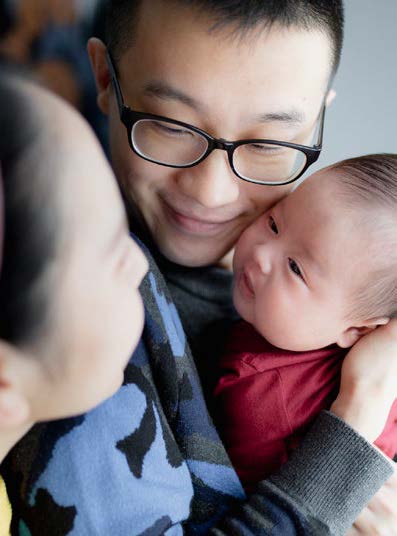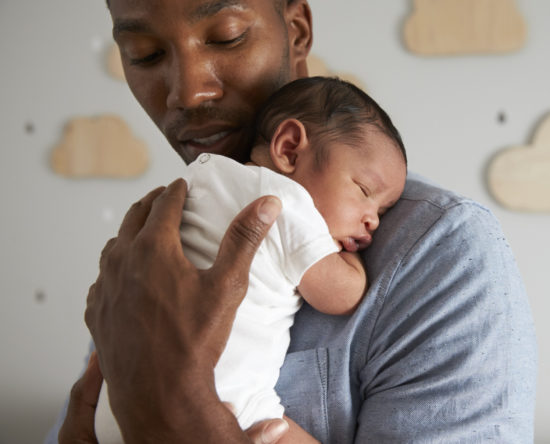Congratulations, you’re a dad. Caring for a newborn can be a huge life change. Read our tips for new dads on how to manage.
In the early days, dads can sometimes feel like the secondary parent. Perhaps taking a back seat and assuming that their partner has everything sussed when it comes to feeding, soothing and caring. In reality, while mums might have a head start with becoming a parent through pregnancy and giving birth, dads can – and do – play an important role.
Newborns seem so fragile at this age – with their little heads lolling all over the place. You wouldn’t be the first dad to worry you might ‘break’ them or feel awkward picking them up. But holding them and looking after them is all part of the bonding experience. And the more you do it, the easier it’ll become.

Gary, dad to nine-month-old twins Arriya and Nieva, says: ‘Have confidence and get involved from day one. I think there’s a tendency to sit back as a new dad and rely on other people. But I think the quicker you get involved, the quicker you build confidence and also bond with your baby.’
Finding out how your baby likes to be held and soothed will also help you feel close to them. Talk to your partner about your roles and your part in caring for your newborn. We’ve got lots of tips on ways to bond with your baby.
In the first week, you might be bombarded with requests from family and friends to meet your new baby. While all the attention is lovely, it can be a lot to deal with. Especially when you and your partner are likely to be feeling worn out. If that’s the case, try to limit visits and enjoy this special time for your new family.
You can always spread visits over a few weeks.
You can always spread visits over a few weeks. People will generally understand that this is a period of adjustment when you’re getting used to caring for your baby.
It can also be nice to spend time together as your new family unit. Your partner might find it more helpful to have visitors if and when you go back to work.
This is exactly the time to accept help or ask for it. If somebody offers to do your washing or cook for you, take them up on it.
When people do visit, don’t feel that the normal rules of hospitality apply. Say yes if they offer to bring a meal with them. Being able to just heat up some food someone else has prepared when you’re shattered and hungry is a lifesaver.
Nobody will expect the house to be spotless, and visitors can easily find the kettle and make their own tea. In fact, they can make you both one too.
Giving birth is physically and emotionally demanding. Regardless of the type of birth she had, you can support your partner’s recovery in lots of ways.

For some women, staying in bed might be the best way to deal with sleep deprivation. If that’s the case for you, your partner will appreciate you bringing her snacks and drinks. And just generally making sure she has what she needs.
If your partner had a caesarean birth or any major medical intervention, she’ll need extra time to recover. Think about the ways you can help by doing the shopping, helping her move around or driving when needed.
As well as physical support, emotional support is so important too. Right now, she’s probably at her most vulnerable so it’s important to know that you’re with her all the way.
Think about your emotional needs too and seek more support if you need it. Talking through how you’re feeling can help.
Likewise, if you feel that your partner’s emotions or behaviour doesn’t feel right, it could be a sign of postnatal depression. Read our article for more about this.
Everybody will have told you how exhausting the early days and weeks can be. Yet nothing can really prepare you for the lack of sleep after becoming a new dad. It might not help much to know that sleep deprivation is common among new parents but at least you know you’re not alone.
Sleep can be one of the most contentious issues after having a baby
Sleep can be one of the most contentious issues after having a baby, as it can feel like neither you nor your partner are getting enough sleep. Probably neither of you are.
Have an honest conversation about sleep and sleeping arrangements. If your partner is getting up to look after the baby, maybe let her get some rest during the day. Or do your bit at the weekend and be the one to answer that 5am wakeup call from your little one….
You’ve probably also heard the recommendation to ‘sleep when the baby sleeps’. OK, so it’s a bit of a cliché but it really does work, and it doesn’t just apply to mums. If you’ve been up in the night looking after your baby or just worn out from the non-stop needs of a newborn, it’s good advice for dads too.

Tom, dad to Tommy (four months) and Freddie (two years), says: ‘Sleep as much as possible, even if it’s two o’clock in the afternoon. If you can just get your head down for a couple of hours it will help you in the long run.’
Everything seems more manageable when you’re rested, so although it might feel a little strange at first, try to sleep or just lie down at every opportunity. When you’re exhausted, it’ll be easier than you think…
Don’t let any visits from family or friends put you off. You don’t have to be constantly on show and presentable for visitors. They’ll understand if you just need to rest. They could push the buggy round the park while you have a lie down.
Babies like to feed frequently which is normal and healthy. This is mainly because they have such small tummies and to also help establish a good breastmilk supply.
You can support your partner in a number of practical ways
Some new dads find that if their partner is breastfeeding, they’re not sure what they can do to help. But you can support your partner in a number of practical ways. You could try fetching drinks and letting her have a break and a rest when she needs to. Read more in our article.
If your partner is finding breastfeeding challenging, you could help her get support from a breastfeeding counsellor on our Infant Feeding line or in person. It can take some mums and babies about six weeks to get the hang of breastfeeding.
Once breastfeeding is up and running, you can get stuck in with bottle feeding your breastfed baby expressed milk or a mixture of breast and formula milk, although using formula can reduce breastmilk supply.
If you and your partner are feeding your baby formula from the start, you can help with bottle-feeding and making up bottles from the outset. For more tips and information, read our article Tips for bottle-feeding your baby.
Having a baby can be all-consuming at first, but remember to put aside some time for you to do the things you used to enjoy. Alan, dad to Rocco, says: ‘Don’t suddenly put the rest of your life on hold. You’ve got to look after your new son or daughter but you’ve got to make sure you have a bit of me time as well. Do some of the things you enjoy, find a way to build that in.’
Read more about friendships and changing relationships as a new dad here.
Our support line offers practical and emotional support with feeding your baby and general enquiries for parents, members and volunteers: 0300 330 0700.
You might find attending one of NCT’s Early Days groups helpful as they give you the opportunity to explore different approaches to important parenting issues with a qualified group leader and other new parents in your area.
Make friends with other parents-to-be and new parents in your local area for support and friendship by seeing what NCT activities are happening nearby.
Our Parents in Mind groups provide support for dads and co-parents experiencing mild to moderate difficulties with wellbeing and mental health.